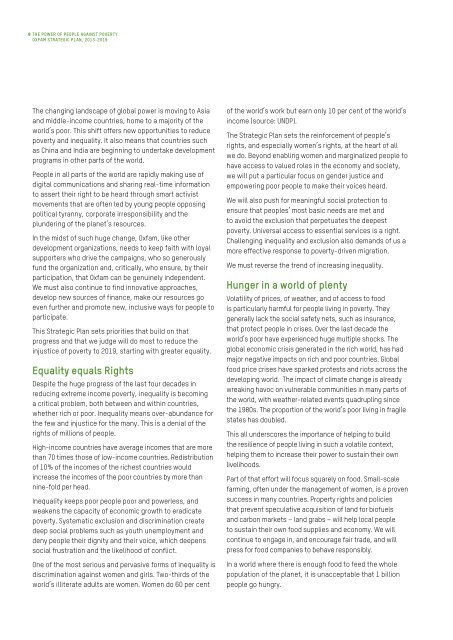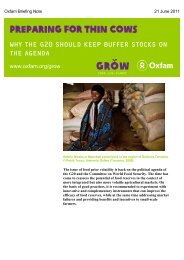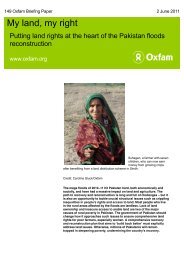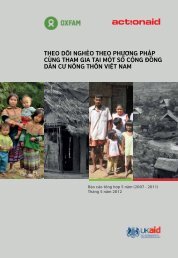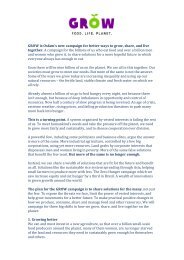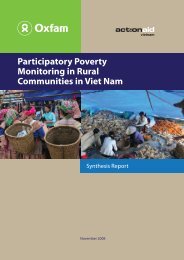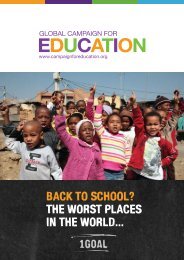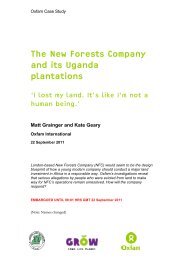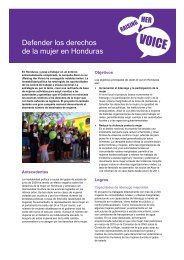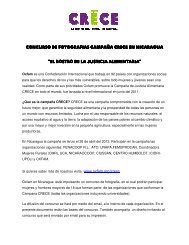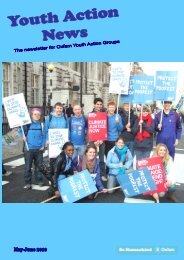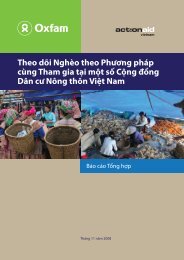Oxfam Strategic Plan, 2013-2019
Oxfam Strategic Plan, 2013-2019
Oxfam Strategic Plan, 2013-2019
Create successful ePaper yourself
Turn your PDF publications into a flip-book with our unique Google optimized e-Paper software.
8 THE POWER OF PEOPLE AGAINST POVERTYTHE POWER OF PEOPLE AGAINST POVERTY 9OXFAM STRATEGIC PLAN, <strong>2013</strong>-<strong>2019</strong>OXFAM STRATEGIC PLAN, <strong>2013</strong> – <strong>2019</strong>The changing landscape of global power is moving to Asiaand middle-income countries, home to a majority of theworld’s poor. This shift offers new opportunities to reducepoverty and inequality. It also means that countries suchas China and India are beginning to undertake developmentprograms in other parts of the world.People in all parts of the world are rapidly making use ofdigital communications and sharing real-time informationto assert their right to be heard through smart activistmovements that are often led by young people opposingpolitical tyranny, corporate irresponsibility and theplundering of the planet’s resources.In the midst of such huge change, <strong>Oxfam</strong>, like otherdevelopment organizations, needs to keep faith with loyalsupporters who drive the campaigns, who so generouslyfund the organization and, critically, who ensure, by theirparticipation, that <strong>Oxfam</strong> can be genuinely independent.We must also continue to find innovative approaches,develop new sources of finance, make our resources goeven further and promote new, inclusive ways for people toparticipate.This <strong>Strategic</strong> <strong>Plan</strong> sets priorities that build on thatprogress and that we judge will do most to reduce theinjustice of poverty to <strong>2019</strong>, starting with greater equality.Equality equals RightsDespite the huge progress of the last four decades inreducing extreme income poverty, inequality is becominga critical problem, both between and within countries,whether rich or poor. Inequality means over-abundance forthe few and injustice for the many. This is a denial of therights of millions of people.High-income countries have average incomes that are morethan 70 times those of low-income countries. Redistributionof 10% of the incomes of the richest countries wouldincrease the incomes of the poor countries by more thannine-fold per head.Inequality keeps poor people poor and powerless, andweakens the capacity of economic growth to eradicatepoverty. Systematic exclusion and discrimination createdeep social problems such as youth unemployment anddeny people their dignity and their voice, which deepenssocial frustration and the likelihood of conflict.One of the most serious and pervasive forms of inequality isdiscrimination against women and girls. Two-thirds of theworld’s illiterate adults are women. Women do 60 per centof the world’s work but earn only 10 per cent of the world’sincome (source: UNDP).The <strong>Strategic</strong> <strong>Plan</strong> sets the reinforcement of people’srights, and especially women’s rights, at the heart of allwe do. Beyond enabling women and marginalized people tohave access to valued roles in the economy and society,we will put a particular focus on gender justice andempowering poor people to make their voices heard.We will also push for meaningful social protection toensure that peoples’ most basic needs are met andto avoid the exclusion that perpetuates the deepestpoverty. Universal access to essential services is a right.Challenging inequality and exclusion also demands of us amore effective response to poverty-driven migration.We must reverse the trend of increasing inequality.Hunger in a world of plentyVolatility of prices, of weather, and of access to foodis particularly harmful for people living in poverty. Theygenerally lack the social safety nets, such as insurance,that protect people in crises. Over the last decade theworld’s poor have experienced huge multiple shocks. Theglobal economic crisis generated in the rich world, has hadmajor negative impacts on rich and poor countries. Globalfood price crises have sparked protests and riots across thedeveloping world. The impact of climate change is alreadywreaking havoc on vulnerable communities in many parts ofthe world, with weather-related events quadrupling sincethe 1980s. The proportion of the world’s poor living in fragilestates has doubled.This all underscores the importance of helping to buildthe resilience of people living in such a volatile context,helping them to increase their power to sustain their ownlivelihoods.Part of that effort will focus squarely on food. Small-scalefarming, often under the management of women, is a provensuccess in many countries. Property rights and policiesthat prevent speculative acquisition of land for biofuelsand carbon markets – land grabs – will help local peopleto sustain their own food supplies and economy. We willcontinue to engage in, and encourage fair trade, and willpress for food companies to behave responsibly.In a world where there is enough food to feed the wholepopulation of the planet, it is unacceptable that 1 billionpeople go hungry.Fair Sharing of ResourcesPoor communities find themselves in competition withpowerful interests for control over the land, water andenergy resources that they depend upon for survival, withwomen and girls often disproportionately affected. Manyof these struggles also pit rich countries against poor,and corporate interests against ordinary women, menand communities. The global consumption of resources isalready outstripping the earth’s capacity to accommodateit.Climate change, too, affects the poor world vastly morethan the rich world that has by far the greatest historicalresponsibility for emissions of greenhouse gases. For poorcountries, tackling climate change is about survival andthe right to develop; for rich countries it is about lifestyleand changing levels of consumption. This is profoundlyunequal.We are also demanding equitable sharing of natural resources. For example, extractive industries need tobecome more transparent, and environmentally andsocially responsible. This means fair sharing of revenueswith local communities and equitable contributions ofroyalties and taxes to national governments.It also requires progressive taxation policies of nationalgovernments to address gross inequalities and enableredistribution, while at the global level, more coordinatedefforts to tackle the scourge of corruption which costspoor governments and poor people vast amounts ofrevenue.Sustainable development and sustaining scarce resourcesare at the core of <strong>Oxfam</strong>’s work.Saving lives, better futures<strong>Oxfam</strong> has a long and well-recognized record of humanitarianrelief in times of natural disaster and crisis. We are gettingbetter, as a partnership of international organizations,at coordinating and delivering the water and sanitation,food, shelter and security that are needed in emergencies.<strong>Oxfam</strong>’s focus in the coming years will also include helpingpeople to guard against future crises by becoming moreresilient. Whether it is adaptation to the vicissitudes ofthe climate, or establishing emergency responses locally,preparation is key. <strong>Oxfam</strong> will focus on the reinforcement ofpeople’s rights to guard against the effects of disaster andto cope with emergencies, ensuring that all parts of societyare part of the response.The focus for our longstanding role of providing essentialservices – such as health and education – is also shifting,to encourage self-managed local solutions. Yet again, itcomes back to people knowing and exercising their rightsand devising approaches that suit their own environment,whether urban or rural. Increasingly humanitarian responsewill need to address the needs of urban communities, inresponse to the huge changes in global demographicswhich see for the first time ever, the world’s urbanpopulation outstripping rural populations.Work on resilience must include a focus on creatingopportunities for young people whose future is threatenedby the failure of the current generation of leaders to tackleunemployment and other problems blighting the lives ofyoung people.Central to <strong>Oxfam</strong>’s work will be new ways of organizing atthe local level for lasting resilience to crisis and poverty.Accelerating actionIn rich and poor countries alike, politically active, organizedand accountable people are beginning to realize theirstrength and their capacity to challenge the vestedinterests that perpetuate the injustice of poverty. We wantto find and support innovative approaches to building amovement for change. <strong>Oxfam</strong> believes that people living inpoverty who claim their rights and make their voices heardconstitute an enormous source of hope for real change andgreater power in people’s lives.That means devoting a lot of effort to linking with others– social movements, trades unions, digital communitiesand faith-based organizations – the transient and theestablished. And we must engage with constituencies whohave not previously been involved in issues of poverty anddevelopment.We will join with networks of citizens, consumers,producers, communities, social movements andcivil society organizations who demand change fromgovernments, the multilateral institutions, the UnitedNations, and companies. Political and business incentiveswill shift through the decisions we take and the choiceswe all make as consumers. Whether by leading low-carbonlifestyles, buying Fair Trade goods, or demanding change inthe streets or through the ballot box, <strong>Oxfam</strong> will work withothers, to help build momentum for change.Critically, we need engagement with business, whethermultinational companies or small and medium-sizedenterprises. That engagement may take the form of both


